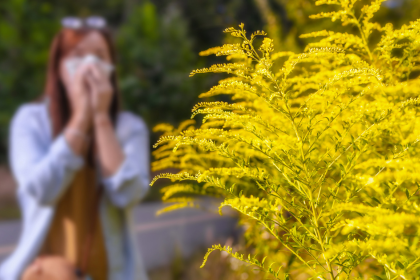GEA - Is It Seasonal Allergies or a Common Cold?
You know it, your runny nose knows it, your itchy throat knows it...Yep, it’s peak spring allergy season. From February to early summer, roughly 81 million people in the U.S. suffer from spring allergies. With symptoms similar to the common cold, it can be difficult to differentiate the two, but it’s important to know for treatment. In this blog, we’ll go over what causes seasonal allergies, the symptoms, how to tell the difference, treatment, and management.
What Causes Seasonal Allergies
Pollen, made by trees, weeds, and grasses, is the trigger for seasonal allergies. Though it’s harmless, the immune systems of people who suffer from allergies mistake the pollen for something dangerous and try to attack it, causing allergy symptoms.
Trees pollinate earliest in the year, followed by grass in late spring, and ragweed in late summer. However, this all depends on the climate you live in. Grass may pollinate throughout most of the year in tropical climates. Mild winter temperatures can cause plants to pollinate early, and a rainy spring can promote rapid plant growth, which increases mold and causes symptoms to last into the fall.
Allergy Symptoms
It’s important to note common symptoms to receive the proper treatment. Allergy symptoms can really take a toll on you and your energy levels with symptoms like the following:
- Congestion
- Headache
- Sneezing
- Itchy eyes, nose, and throat
- Runny nose and eyes
- Postnasal drip
- Fatigue
- Dry cough
How to Tell the Difference
Cold symptoms and allergy symptoms have many similarities, making it hard to tell the difference. Similar symptoms include a runny or stuffy nose, sneezing, headaches, and fatigue. However, there are cold symptoms that aren’t present with allergies, such as the following:
- Fever
- Wet cough
- Body aches
- Sore throat
Some other differences are the consistency of mucus (thicker with a cold), the lack of a trigger (time of year), and the length (colds last about one to two weeks, whereas allergies can last months).
Seasonal Allergy Treatments and Management
If you suspect that you have seasonal allergies, it may be time to see an allergist. They’re the best resource for finding the source of your suffering and treating or stopping the symptoms. At your allergist appointment, they most likely will conduct an allergy test. There are two types of allergy tests: skin tests and blood tests. For a skin test, the doctor will prick the skin (typically your arm or back) and inject a small amount of suspected allergens. If an allergy exists, your skin will react by becoming itchy and inflamed, immediately giving you results. For a blood test, your blood is drawn and sent to a lab. Results can take several days to come back, but more allergens can be tested.
Treatments
There are many over-the-counter medication options to help relieve allergy symptoms, including the following:
- Oral Antihistamines: These pills can help relieve sneezing, itching, a stuffy/runny nose, and watery eyes. Examples of this include Zyrtec, Allegra, and Claritin
- Corticosteroid Nasal Sprays: This helps relieve nasal symptoms such as a runny/stuffy nose and congestion. Examples include Flonase, Nasacort, and Rhinocort.
- Cromolyn Sodium Nasal Spray: This nasal spray helps by blocking the release of immune system agents that cause allergy symptoms and works best if used before exposure to allergens. This spray usually needs to be used 4 to 6 times daily.
- Oral Decongestants: These temporarily help with nasal stuffiness, like Sudafed. Some medications combine an antihistamine with a decongestant for even more relief, including Zyrtec-D, Allegra-D, and Claritin-D.
When over-the-counter treatments aren’t enough, your allergist may prescribe a medication or recommend receiving allergy shots, which are regular injections containing tiny amounts of the substances causing your allergies. This desensitization over time provides relief by reducing your immune system’s reaction to specific allergens.
Management
There are many strategies to limit your exposure and ease your symptoms, including the following:
- Check your local weather station for daily pollen and mold spore levels. This can help you plan to stay indoors when levels are high.
- Start allergy treatment before peak season.
- Keep your indoor air clean by having the A/C on and closing all windows and doors in your home, office, and car.
- Wear a face mask when doing yard work and spending extended periods of time outside, especially when mowing the lawn.
- Remove your clothes you've worn outside and shower right away to rinse pollen from your skin and hair.
- Brush off your pets after they’ve been outside to prevent allergens from coming inside with them.
While these tips won’t completely rid you of your seasonal allergies, they can help limit your exposure to pollen and lessen your symptoms.
Supplemental Insurance: Helping with Seasonal Allergies
If your seasonal allergies are getting to be too much and you visit an allergist, they may prescribe you medication or allergy shots. However, you might not be able to afford the co-pay, testing, or treatment, so you suffer from itchy eyes, fatigue, and a runny nose for 3+ months.
No one should have to suffer for months due to seasonal allergies! Consider adding a supplemental insurance plan that can help with extra out-of-pocket expenses.
GEA’s Supplemental Insurance
If you have TRICARE or CHAMPVA as your primary insurance plan, help cover medical expenses not covered by adding GEA’s Supplemental plan. Designed to wrap around your existing plan, it can help cover out-of-pocket costs including co-pays and prescriptions. So, all you have to worry about is treating your seasonal allergies.
Visit our website to learn more or calculate your rate today with our free rate calculator.



